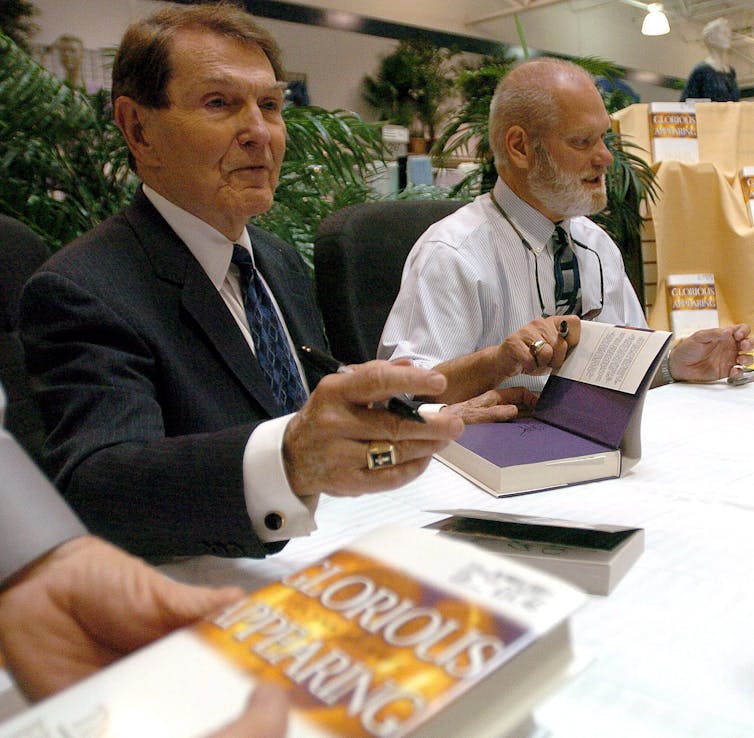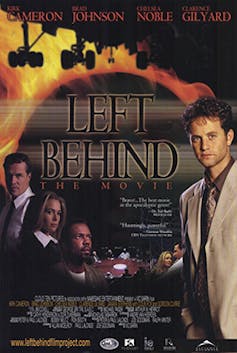The bestselling evangelical Christian fiction of the 21st century couldn’t be more morally different — from itself.
For example, William Paul Young’s 2007 novel The Shack is about the kidnapping, abuse and murder of a child. Selling more than 20 million copies, it tries to understand how such evil can occur in a universe with a good and all-powerful God. Theologically wrestling with these events, it centres on ethics of harm, healing and reconciliation.
Meanwhile, the most popular evangelical fiction of the turn of the 21st century was the 12-volume Left Behind series, about the coming of the Antichrist and the final End Times or Armageddon. The series has sold more than 80 million copies. Its violent action dwells on the persecution of Christians by the global United Nations, led by the Antichrist. It emphasizes themes of proper authority, in-group loyalty and traditional ideas about sex, sexuality and gender.
Moral Foundations Theory (MFT), developed by social psychologist Jonathan Haidt and others, suggests that human societies configure their moral expectations differently from group to group, but they do so based on universal considerations of care, justice, liberty, purity, loyalty and authority.
At first, MFT seems to show that the spectrum of values represented in The Shack and Left Behind are just a matter of a diversity of ethical opinion.
But my new open-access research reveals a flaw within MFT itself: the moral intuitions exhibited by Left Behind are associated with social dominance and authoritarianism.
(Lionsgate)
Care, justice, liberty
In MFT’s terms, The Shack prioritizes the ethics of care, justice and liberty. It has lots of theological dialogue about God’s fairness in the face of evil and suffering. Its explanations about free will and original sin are traditional Christian theology and their persuasiveness depends on a reader’s prior beliefs.
It also focuses on care after harm has been done. The bereaved father of the daughter has a weekend away with the Christian God as Trinity, healing and establishing friendships with God. The daughter is in heaven — compensation for a harm that cannot be undone. The novel is egalitarian: God the Father is an African American woman, God the Spirit an Asian American woman and God the Son a Middle Eastern looking man.
Popular Christian novel ‘The Shack’ finds a surprising solution to the problem of evil: Polytheism
Other moral foundations are present but less important. God’s authority is challenged. Group loyalty is downplayed. We feel revulsion at the killer’s pedophilia, but the focus is on the harms of abuse and murder, not so much violated sacredness.
Authority, loyalty, sanctity
Left Behind’s moral foundations are nearly opposite to The Shack. They emphasize authority, loyalty, sanctity and justice as vengeance. The series is about overturned authority. It depicts the Antichrist as the UN Secretary-General usurping God’s proper rule.
Haidt notes that for conservatives, care is “blended” with loyalty, and the same is true of the Left Behind series. The authors deem their Christian characters (who are occasionally martyred) worthy of care, but not so much the billions of humans who suffer and die during the tribulations.

(Shane Bevel/The (Shreveport) Times via AP)
In one sequence, the protagonist mocks abortion providers for losing business because unborn babies have been swept into heaven as the End Times begin. When the Antichrist refers to “fetal material that vanished,” we detect that the book frames abortion as being a problem about sexual sanctity, not a problem about harm.
Apocalyptic genre

(Namesake Entertainment/Cloud Ten Pictures)
Left Behind’s genre — apocalypse — is also concerned with God’s justice, but the book’s justice entails revenge. In the final novel Glorious Appearing, warrior Jesus slays the Antichrist’s army, creating a “river of blood several miles wide and now some five feet deep.” He then sentences most of the human race to eternal torture in the fires of hell.
The series does not feature egalitarianism: white Christian men are in charge of the Tribulation Force. Men and women are (supposedly) equal before God, but God has made them to “complement” one another with different gender roles, with men in spiritual authority over their wives and children.
Insofar as female, non-white and Jewish characters come to God and accept the authority of evangelical white men, they can be considered part of the group.
Not all ‘moral foundations’ are moral
MFT proponents might argue that these two examples allow us to see the full range of ethics in contemporary (white) evangelical literary tradition and its cultures — even if evangelical cultures are lopsidedly conservative, as their support for Donald Trump shows.
On the contrary, as my open-access article shows, moral psychologists have empirically demonstrated that the authority, loyalty and sanctity intuitions preferred by conservatives are not actually matters of ethics at all. Rather, as MFT’s critics argue, they are “dispositions associated with authoritarianism and social dominance.”
We might better think of authority, loyalty and sanctity intuitions as preferences for order rather than truly ethical foundations. Those preferences may have their place in human societies, but treating them as equal to ethics of care, justice and equality is a moral relativism that masks dangerous authoritarian tendencies.
Republicans draw from apocalyptic narratives to inform ‘Demoncrat’ conspiracy theories
Dramatization of a disordered world
Even though Left Behind might be beloved by conservative “value voters,” its chief values, it seems, are not moral values at all.
The series emphasizes the Christian Right’s struggle amid declining demographics and challenges to its political power. The series also encourages the perception of threat among the Christian Right, and a continued sense of persecution by liberal secular elites.
What MFT does illuminate is Left Behind’s continued cultural power. The series was adapted to film a sixth time just last year, yielding yet another dramatization of a disordered world where loyalty, sanctity and authority are upended.
Those intuitions find expression in apocalypse: an extreme moral dualism wherein the besieged community’s political foes are imagined as the enemies of God who must be opposed until God’s Kingdom arrives to restore order and deliver retributive justice.
Range of moral foundations
We can read contemporary Christian fiction for the considerable range of moral foundations that it expresses. Doing so reveals that our morals do not so much come from our religious traditions as much as another possibility: our psychological predispositions find the values we already have in culturally mediated religious traditions.
Christianity is a big space. Some people might be challenged by its moral tenets, but many more might discover confirmation of their political and psychological preferences.




